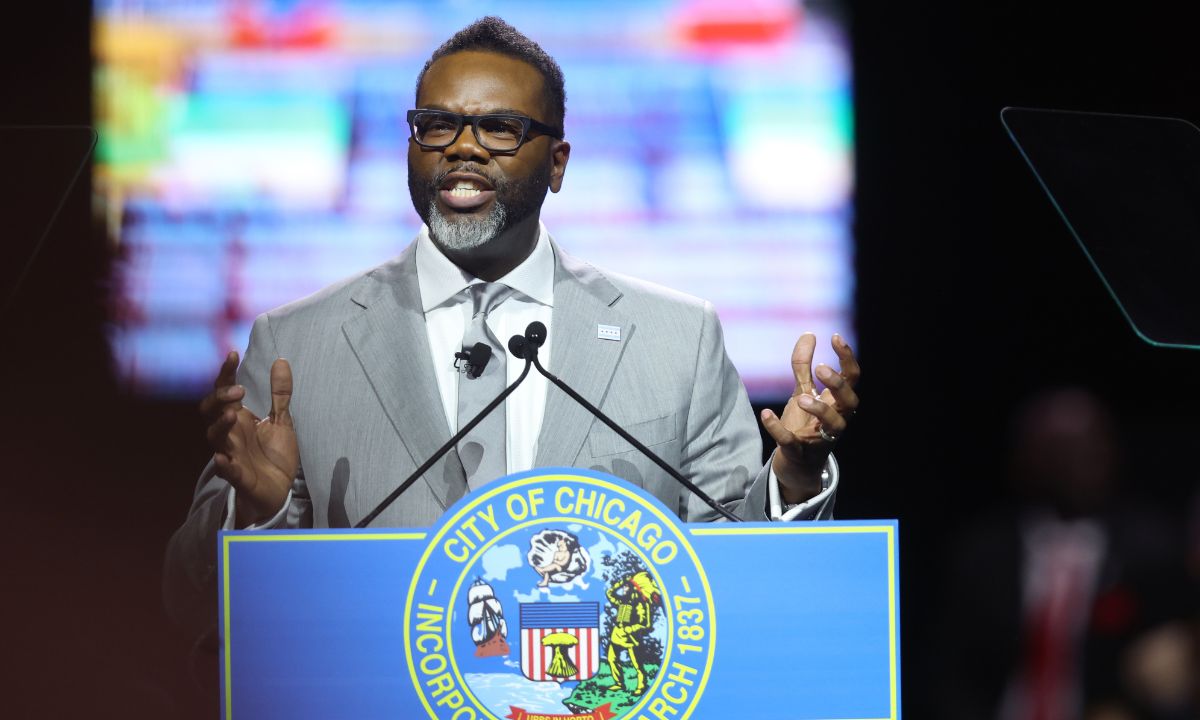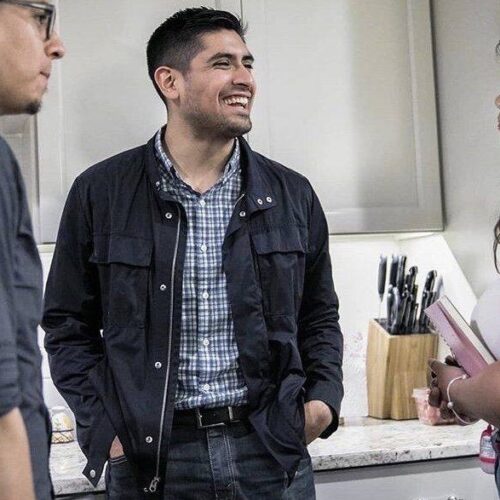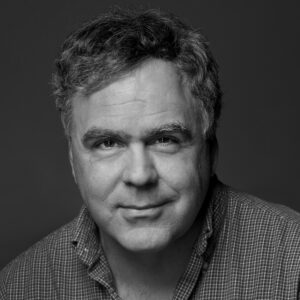Chicago’s First School Board Race Brings a Mixed Bag of Ideologies
10 new board members will join 11 others who will be appointed by the city’s mayor in coming weeks.

Get stories like this delivered straight to your inbox. Sign up for The 74 Newsletter
This article is part of The 74’s EDlection 2024 coverage, which takes a look at candidates’ education policies and how they might impact the American education system after the 2024 election.
Facing their first-ever election for school board, voters in Chicago on Tuesday delivered a decidedly mixed message, electing 10 candidates with competing ideologies to serve on a governing body that will eventually total 21 people.
Official results showed that candidates backed by the powerful Chicago Teachers Union won four seats, one of them unopposed. Meanwhile, pro-school choice candidates backed by wealthy donors won three seats, with three seats won by independent candidates.
The independents include a rapper who beat three opponents on the city’s South Side. Che “Rhymefest” Smith said he ran to ensure that every school gets a registered nurse, a librarian, counselors, tutors, support staff and quality arts instruction.
The 10 new board members will join 11 others who will be appointed in coming weeks by Mayor Brandon Johnson, a former teacher and union organizer.
“There’s a lot going on here,” said Hugo Jacobo of Chicago Democrats for Education, a nonprofit that supports independent school board candidates.

Groups that advocate for charter schools spent about $3 million on the race, The Chicago Sun-Times reported, with the union spending about $1.6 million on its endorsed candidates through its own political action committees and at least eight other PACs. Other estimates show the union spending more than $2 million on the races.
The union’s preferred candidate came up empty in District 3, one of Chicago’s most politically progressive areas. A reform-oriented candidate, Carlos Rivas Jr., beat union-endorsed candidate Jason Dones by 12 percentage points, despite a reported $300,000 in donations. The union painted a more positive picture Tuesday night, with President Stacy Davis Gates telling a crowd, “Billionaires spent a lot of money to get three out of 21,” referring to the larger board that will eventually be seated. “I keep telling you, it’s cumulative. It keeps getting bigger and it keeps growing. And we want more people for this group project.”
Tuesday’s results push Chicago Public Schools, the fourth-largest school system in the United States, into a new phase, with observers saying a fully elected board could improve schools and make them more responsive to parents and taxpayers.
But whether the shift will curb the system’s recent chaos is another matter.
Last month, the entire seven-member board resigned after Mayor Brandon Johnson threatened to oust schools CEO Pedro Martinez. Johnson had appointed six of the seven members in July.
He brought in a new board, but a week later the newly appointed president, the Rev. Mitchell Ikenna Johnson, resigned after news reports revealed he’d written antisemitic and sexist posts on social media and posted that he agreed with a theory that the Sept. 11, 2001, terrorist attacks were an “inside job.”
Tuesday’s split result, while offering what will likely be a variety of perspectives on finances, management and curriculum, is bound to be just the beginning of a new, and perhaps even more tumultuous era — for one thing, all 21 seats, including the 10 from Tuesday, will be on the ballot in 2026.
“This first cycle was really a warm-up for 2026, when all 21 seats are up for election and the stakes are real,” said Peter Cunningham, a former head of communications for the district and founder of the nonprofit Education Post.
Cunningham, who also served as a spokesman for U.S. Education Secretary Arne Duncan, said Tuesday’s election “became a referendum on Mayor Johnson and the teacher’s union because of the chaos at the board over the last few months. They did not get a clear mandate to pursue their more controversial policy proposals, but they will likely do it anyway because this is their last chance to control the board.”
The range of ideologies among fully elected board members could fuel further drama, said Meredith Paige, a mother of two high schoolers and leader of CPS Family Dyslexia Collaborative, an advocacy group.
“The chaos is going to continue,” she said.
From appointed to elected board
For nearly 30 years, Chicago’s mayors have enjoyed the right to appoint and dismiss board members, with the city standing for decades as one of just a handful with mayoral control — New York City, Boston, Washington, D.C. and Detroit are among others where mayors still wield considerable power over school policy.
Until now, Chicago Public Schools was also the school district in Illinois that didn’t have an elected board. But the state legislature in 2021 ordered the city to transition to a fully elected, 21-seat board.
It may take a while for the changes to sink in with voters, said Paige, who canvassed in neighborhoods last week and met “a lot of people who had no idea that there was a school board election.” Others believed Chicago already had an elected school board. “So that’s been a problem the whole time,” she said. “Even now, parents don’t understand how this is going to work.”
Among the first business items the hybrid board will face in coming months: whether to terminate the contract of Martinez, the schools CEO, who has served since 2021. They must also decide whether to approve Johnson’s push to borrow hundreds of millions of dollars to defray short-term expenses, including a $175 million pension payment for non-teaching employees.
The district faces a projected deficit of $505 million next fall, due partly to rising healthcare costs and the expiration of federal ESSER pandemic funds. Johnson’s predecessor, Mayor Lori Lightfoot, also shifted hundreds of millions of dollars in pension costs from City Hall, which had historically underwritten them, to the district.
And the city is also hemorrhaging students: enrollment has dropped by 20%, or more than 80,000 students, since 2010.
In July, Martinez and the school board proposed a $9.9 billion budget that aimed to close the deficit through staff cuts and freezes affecting nearly 250 jobs. The board authorized the budget as written, but relations between the mayor and the district soured.
Johnson has proposed taking out a $300 million loan to fund teacher pay increases and pension contributions, and he made headlines in October for comparing his critics to confederates who opposed freeing slaves “because it would be too expensive.”
Even if both sides agree on a new source of spending, the district and the union are also engaged in a contentious negotiation over the terms of the next teacher contract. One estimate said paying out an expected series of teacher raises and taking on more pension debt from the city could increase its deficit to nearly $1 billion.
Despite Johnson’s bid to fire Martinez, the CEO remains popular, said Jacobo of Chicago Democrats for Education. “He’s the only one really concerned about the financial situation of our city and our school district system, so people want someone responsible like him to stay.”
Paige, the parent advocate, agreed. “The mayor and CTU want to fire the CEO, who has brought a lot of stability to the district. So there’s a lot of frustration over that.”
She said the bitter, two-week teachers’ strike in 2019 is also having lingering effects: “There’s still a lot of toxicity in the system over that — and just a general” she hesitated, “‘frustration’ is the nicest word I can think of right now — that the mayor seems so disconnected from reality of the financials that he wants to put the district in peril to pay the teacher’s contract.”
The state legislature has given Chicago until 2027 to transition to a fully elected board, and despite the challenges, Jacobo said the change will be welcome.
“I’m very glad that there will be a number of these new school board elected members who honestly are just not beholden to anyone but the parents, the voters in their district,” he said. “And when they talk, when they speak, it’ll be with a perspective of what is best for their community. I think it’s one step forward, but a lot of work to go.”
Get stories like these delivered straight to your inbox. Sign up for The 74 Newsletter

;)
